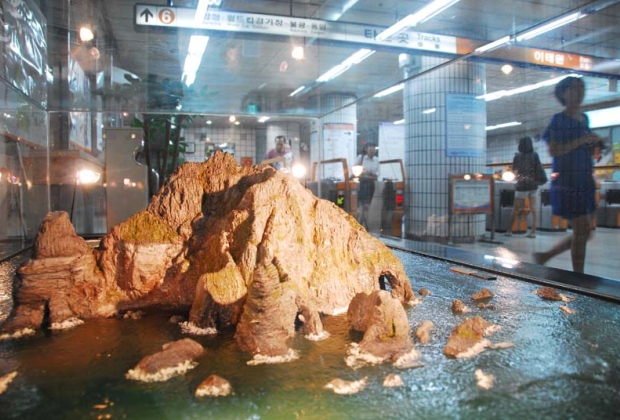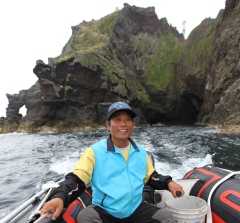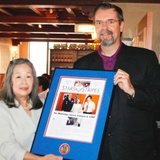South Korea's passion over disputed islands gets Japan's attention

SEOUL — When a South Korean soccer player held up a sign saying “Dokdo is our territory” at the London Olympics, he struck a chord of nationalism back home while putting an international spotlight on a dispute with Tokyo over a pair of tiny islands that few in Japan cared about.
Park Jong-woo’s action after a 2-0 victory over Japan earned him a ban from attending the medals ceremony and criticism for recklessness — but admiration for bravado in South Korea, where the rocky outcroppings have become a major issue, even though they seem to have little real value.
While experts say the dispute is unlikely to escalate into military action, it is among several potential flashpoints at sea in Asia. Japan has another dispute over the Diaoyu-Senkaku islands with China, which also veered dangerously close to conflict recently with the Philippines over Scarborough Shoal.
John Delury, a professor at Yonsei University in Seoul, said the near-simultaneous intensification of the island disputes reflects the changing balance of power in East Asia, with China’s rise and a perceived U.S. pivot away from the region, even though Washington is starting to refocus its attention on the Pacific as the wars in Iraq and Afghanistan wind down.
“That’s the underlying context in which all these unresolved maritime disputes are breaking out, and I think many of the actors don’t really know how to settle it,” Delury said. “It’s really playing out in a maritime context; that’s what’s so striking. We don’t have a lot of terrestrial conflict, but the seas aren’t as definite, the borders aren’t as defined.”
Gaining international recognition of South Korea’s claim to Dokdo, known in Japan as Takeshima, has become a national rallying point in recent years, from the president all the way down to high school students. Ownership of Dokdo is accepted as an undisputed fact. Pro-Dokdo signs and T-shirts are a common sight. Models of the islands are set up in some subway stations in Seoul. Traffic signs showing the distance to Dokdo can be spotted on roadways.
But in Japan, the issue had gained little attention until recently.
“I think half of my students don’t know where it is,” said Toshimitsu Shigemura, an expert on Korean issues at Waseda University in Tokyo.
Both South Korea and Japan say they have multiple historical documents backing their ownership of the islands. South Korea maintains a small police presence there. Both countries acknowledge disputes over the islands and the surrounding fishing waters in centuries past, but each says those arguments were resolved in their favor.
Even the name of the body of water where the islands are located is in dispute – Seoul calls it the East Sea; Tokyo says it’s the Sea of Japan.
The United States has remained neutral in the dispute, referring to the islands as the Liancourt Rocks.
“Both of these countries are strong, important valued allies of the United States,” State Department spokeswoman Victoria Nuland said last month. “It’s obviously not comfortable for us when they have a dispute between them, so our message to each of them is the same: work this out, work it out peacefully, work it out through consultation.”
The traditionally disparate attitudes toward Dokdo — apathy in Japan and a passion in South Korea that often seems to dwarf concerns about neighboring North Korea — stem from unresolved tensions about the nations’ colonial past, including Japan’s forced prostitution of South Korean “comfort women” during its 35-year occupation of the peninsula.
“For Koreas, Dokdo is a symbol of Korea’s colonization and its liberation in 1945. It’s also linked to other issues with Japan — the sex slave issue,” Robert Dujarric, director of Temple University’s Institute of Contemporary Asian Studies in Japan, told Stars and Stripes by email. “For the Japanese, it’s just a couple of islets without any historical or political significance.”
Some South Koreans believe Japan’s refusal to give up on Dokdo is a sign that it secretly wants to reconquer the Korean peninsula.
Delury said that while Japan or the U.S. may want South Korea to move on, “the Korean response is, ‘No, that’s exactly what Japan wants is for us to move on, and we can’t let that happen.’ ”
Kwak Jino, a research fellow at South Korea’s government-run Dokdo Research Institute, said the media in both South Korea and Japan have aggravated tensions but have not diminished the popularity of Japanese culture in his country. The dual attitudes towards Japan are particularly evident among youth — an enthusiasm for manga cartoons and J-pop, and resentment over its claims to Dokdo.
“Young people in South Korea are suspicious that Japan is living in a dream world, with the same imperial delusions it had in the past,” he said. “So, they get angry.”
High school student Jin Min-sik has spent much of the past six months campaigning to persuade Tokyo to renounce its claim to Dokdo.
“Taking away something occupied by somebody else is stealing,” said the 18-year-old head of the Korea Youth History United group, one of dozens of grassroots organizations seeking to draw attention to Dokdo.
“Everybody in South Korea who took their national history lessons in school knows about the atrocities Japan committed in the Asia-Pacific region,” he said, referring to Japan’s actions during World War II. “Japan has been stubbornly persisting that Dokdo is theirs. So, such action makes us think worse of Japan.”
Japan’s public apathy on the issue is slowly changing, following Lee Myung-bak’s visit to the islands on Aug. 10, the first by a sitting South Korean president. He subsequently announced that the Japanese emperor should apologize for the colonial era if he were ever to visit South Korea, drawing ire from Japan and motivating Tokyo to temporarily withdraw its ambassador to Seoul.
“It is very natural for President Lee to visit Dokdo, because Dokdo is Korean territory, however Japan claims,” said Lee Miyon, a spokesperson for the president’s office, adding that the trip was not intended to anger Japan or draw international attention to the islands.
Lee also said the president’s remarks about the emperor were mischaracterized and were intended to convey that an apology would help South Koreans deal with the two countries’ history.
Japan has since requested that the matter be brought before the International Court of Justice for a ruling. South Korea has rejected the move, denying that Dokdo is a contested territory.
“No territorial dispute exists regarding Dokdo, and Dokdo is not a matter to be dealt with through diplomatic negotiations or judicial settlement,” a statement on the South Korean foreign ministry website says.
A spokeswoman for the Japanese prime minister’s office declined to discuss why the country considers the islands important, and why Japan allows South Korea to maintain a presence on what it considers Japanese territory.
Japan’s Ministry of Foreign Affairs website states that “the occupation of Takeshima by the (Republic of Korea) is illegal, with no basis in international law.”
A “fact sheet” released by the ministry further states that South Korea’s attempts to establish a historical claim to the island indicate it is not confident in its ownership.
“The government of Japan will continue to take appropriate measures to settle the issue in accordance with international law and in a calm and peaceful matter,” the document says. “These measures include the submission of the dispute to the ICJ on its own.”
Until Lee’s visit to the islands, Takeshima had long been a vague afterthought for much of Japan other than Shimane prefecture, whose fishermen troll the waters surrounding the island.
The issue has since become a fixture on news broadcasts — a normal occurrence in South Korea but not Japan. On heavily traveled Japan Rail lines snaking through Tokyo, small TV screens above the train doors recently broadcast images of South Korean Marines invading an island during a past exercise as part of a story that looped every few minutes.
“I think there was a general feeling by the people that we were provoked” by Lee’s visit, said Kazuhiko Togo, former senior Japanese foreign ministry official and now director of the Institute for World Affairs at Kyoto Sangyo University, told a news conference in Tokyo. “This television image (of Lee’s visit) really had an impact in changing the minds of the people.”
Japan recently began running newspaper ads meant to educate the public about Takeshima. They claim Japan established sovereignty over the islands by the mid-17th century, and South Korean documents that purport to establish Seoul’s claim to the islands are vague and do not provide “clear evidence to back up their claim.”
Japanese officials say the government has made strong efforts to publicize its claim to Takeshima and educate students about the territory. However, Kenji Choda, chairman of a territorial issues committee at the Chugoku-area chapter of the Junior Chamber International Japan, said few Japanese know about the islands. He blames a lack of education in elementary and junior high schools.
In a JCI survey of Japanese high school students three years ago, less than 2 percent were correctly able to draw lines identifying the country’s borders, he said.
In Shimane prefecture on Japan’s west coast, officials have declared Feb. 2 as “Takeshima Day” and hold local and nationwide forums and speaking events, as well as essay contests for students, to promote awareness of Shimane’s claim to the islands. But Sho Yamasaki, a prefectural official in charge of the issue, said local authorities are frustrated by the lack of public interest.
“There is a need for the government to promote the issue nationally,” he said.
For many in Japan, territorial claims are an uncomfortable reminder of the country’s imperial history and past nationalism that government and schools have tried to downplay since World War II.
“[Japan] reflected and taught the public to regret and object to” territorial disputes and claims for sovereignty since those issues are what led to World War II, Shigemura said.
On the other hand, he said South Koreans are still dealing with the trauma of colonization and fear that ceding any land will push their country back toward future Japanese domination.
Even Prime Minister Yoshihiko Noda acknowledged a learning deficit about the islands:
“We need to thoroughly teach our children in schools that Takeshima and Senkaku are sovereign territories of Japan. There are even some adults who don’t know,” he told an upper house budgetary meeting in August.
The existence of the islands is first introduced to students in a fifth-grade geography textbook, and South Korea’s claim is not taught until junior high, according to the Ministry of Education, Culture, Sports, Science and Technology.
Masashi Nishida, a ministry official, said the amount of time and detail spent on Takeshima is up to individual schools, and there are currently no specific plans to increase education about the islands.
But in South Korea, the Dokdo dispute is woven throughout the curriculum beginning in elementary school, when students study materials that emphasize “love of territory and defending our sovereignty,” according to a spokesperson for the Ministry of Education, Science and Technology.
All schools are encouraged to devote at least 10 hours of instruction per year to Dokdo in citizenship, Korean language and literature, social studies and geography classes. Students are even given supplementary textbooks entitled “Let’s Get Dokdo Right” and “Our Forever-land, Dokdo.”
The lessons continue outside the classroom. Schools celebrate Dokdo Love Week in October, and high school students are encouraged to be “global and history diplomats” who promote South Korea’s claim to the islands and urge the renaming of the Sea of Japan. Teachers are encouraged to visit the islands.
Baek Seung Joo, a senior researcher at the Korea Institute for Defense Analyses in Seoul, said Japan’s claims to Dokdo provoke an almost physical response.
“If we see Dokdo as a part of the human body, we feel so much pain” because of Japan, he said.
Stars and Stripes reporter Erik Slavin contributed to this story.
rowlanda@pstripes.osd.mil;burkem@pstripes.osd.mil; kusumotoh@pstripes.osd.mil; chang.yookyong@pstripes.osd.mil












